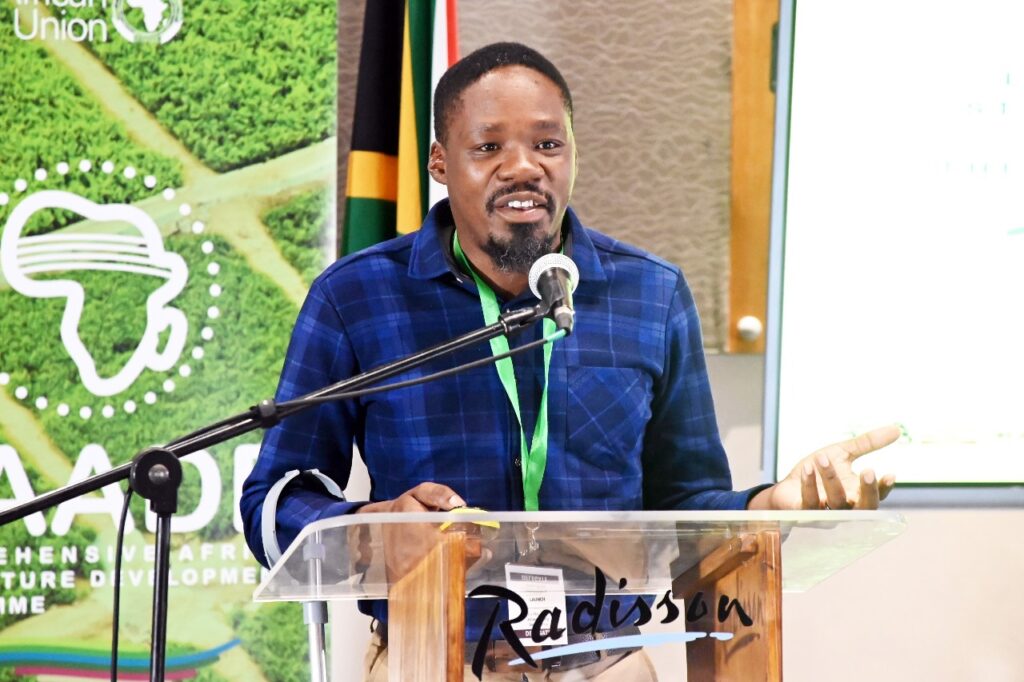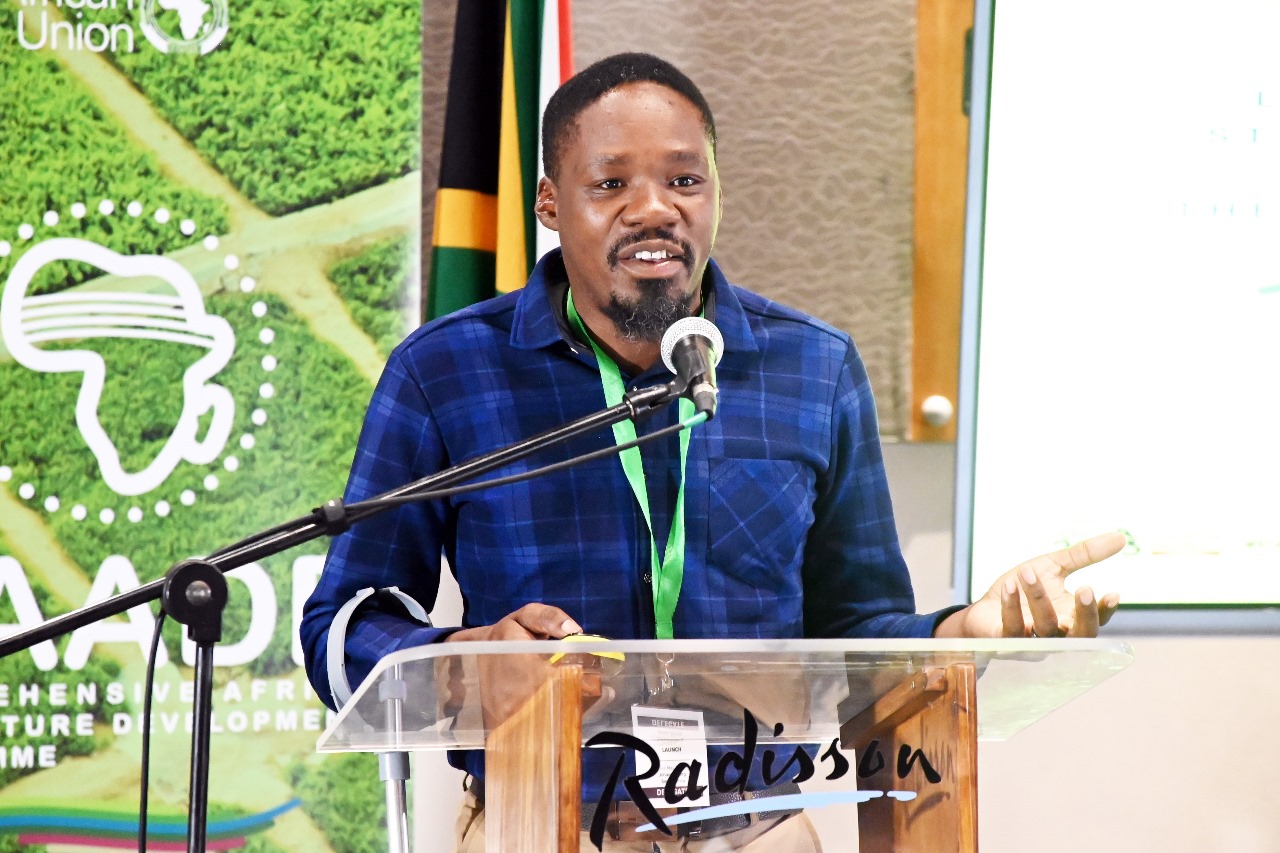
By Staff Reporter
06 May 2025, Johannesburg, South Africa– In a compelling presentation delivered during a high-level stakeholder engagement on the domestication of the Kampala CAADP Declaration, Dr. Baboloki Semele, a youth and gender policy advocate called for a bold and transformative inclusion of young people in Africa’s agricultural policy landscape. His remarks, which focused on the strategic engagement of youth in the Comprehensive Africa Agriculture Development Programme (CAADP), emphasized the critical need to move youth from the periphery to the center of policy, implementation, and accountability frameworks.
CAADP, which is the African Union’s flagship program for agricultural transformation, food security, and nutrition, entered a new era with the 2025 Kampala Declaration. The Declaration outlines priorities for the Post-Malabo period and reaffirms commitments to inclusive agricultural development. According to Dr. Semele, who is also expert validator of African Union high Level panel on Emerging technologies (APET Publications), for CAADP to deliver on its promise, youth must no longer be treated as beneficiaries but must be recognized as equal partners and co-creators of Africa’s food system future.
Mandatory Youth Representation in CAADP Structures
Dr. Semele began his presentation by advocating for the mandatory representation of young people in national CAADP teams, steering committees, and technical working groups. He urged member states to integrate youth into every layer of decision-making, including Joint Sector Reviews (JSRs), which assess the progress and impact of agricultural policies.
“Each country must establish a ‘Youth CAADP Focal Point’ to coordinate youth engagement and ensure that young voices shape policy and programming,” he said. “Without structural representation, we risk designing programs that are out of touch with the largest demographic of our continent.”
He highlighted that in Africa, where over 60% of the population is under the age of 25 and where youth are expected to constitute nearly 75% of the workforce by 2035, such an oversight would be a strategic blunder
Inclusive Technology for Youth with Disabilities
One of the highlights of Dr. Semele’s presentation was his emphasis on youth with disabilities, who are often marginalized in policy spaces. He called for collaboration between ministries of agriculture, social development, and innovation to create inclusive, tech-driven programs that cater to all youth.
Emerging technologies such as voice-activated farming apps, AI-powered navigation tools, and smart prosthetics for agricultural labor were spotlighted as key tools for inclusion. “These innovations are not just technical solutions; they are gateways to dignity, productivity, and economic independence for youth with disabilities,” he noted.
He further proposed targeted training and financing mechanisms that empower disabled youth to venture into agri-enterprises and digital agriculture platforms.
Transparency and Accountability Through Youth-led Information Centers
Dr. Semele proposed the establishment of CAADP Virtual Information Centers national or regional hubs operated by youth to monitor budget allocations, project implementation, and policy progress. These digital platforms would serve as transparency engines, offering dashboards, hotlines, newsletters, and scorecards that track how governments are delivering on their agricultural promises.
“When youth have access to information, they can hold institutions accountable and re-inspire trust in governance,” he stated. “Transparency is not a luxury it is the bedrock of implementation.”
Dr. Semele called for deeper investment in youth-led monitoring and evaluation (M&E) systems, proposing partnerships with universities, agri-tech incubators, and development organizations. He envisioned youth designing AI-based dashboards to track nutrition, market trends, and crop yields, linking digital innovation to the real-time needs of rural communities.
“Young people should not only benefit from data they should produce it,” he emphasized, proposing the creation of community data labs where youth generate, interpret, and apply evidence for local policy action.
He also promoted the revival of indigenous food systems an often-overlooked component of food security and climate resilience. Dr. Semele urged governments to incorporate traditional crops into national food policies, while encouraging youth to brand, package, and export indigenous products.
“Traditional food is not outdated,” he said. “It is nutritious, climate-smart, and a cultural asset that youth can turn into viable enterprises.”
He recommended school campaigns and community cooking demonstrations to raise awareness about the nutritional and environmental value of indigenous crops such as millet, sorghum, and morama beans.
Recognizing that not all youth will become farmers, Dr. Semele highlighted the AfCFTA Youth Trade Scouts Program as a way to tap into non-land-based agricultural employment. He suggested integrating the program into national AfCFTA strategies and youth entrepreneurship initiatives.
“With the right support, youth can be trained as Trade Scouts, helping SMEs navigate compliance, digital marketing, and intra-African trade systems,” he said. “These are green jobs high-value roles that do not require land ownership but can transform agri-food systems.”
A key proposal was the ringfencing of 10% of agricultural budgets for youth-focused agripreneurship initiatives. This would fund incubation centers, innovation hubs, access to land and credit, and digital platforms linking young farmers to supply chains.
Dr. Semele stressed the need for contract farming models, out-grower schemes, and graduate placement programs that connect youth to extension services and rural employment.
“Every dollar we invest in youth agripreneurship is a dollar towards economic transformation, peace, and resilience,” he asserted.
Dr. Semele’s presentation concluded with a strong call to institutionalize youth participation across all pillars of CAADP; policy design, implementation, monitoring, and evaluation.
He urged the African Union, Regional Economic Communities, and Member States to build a continental Youth for CAADP Movement, training young journalists, influencers, and community leaders to popularize CAADP goals and document progress from the ground up.
“Youth are not just a demographic they are a democratic force, an intellectual force, and a labor force,” Dr. Semele said. “If we leave them out, we leave Africa behind.”
As the African Union moves into the Post-Malabo Strategy era, Dr Semele says it is clear that youth inclusion is not an option but an imperative. Dr. Semele made a clarion call that the time is now for Africa to invest in its youth not merely with words, but through tangible policies, resources, and platforms that recognize them as partners in transformation.
About Dr Baboloki Semele
Dr. Baboloki Semele is a 2023 Mandela Washington Fellow under the Civic Engagement track at the Presidential Precinct in Charlottesville, Virginia. Following the fellowship, he founded the Youth for Gender Equality Foundation, a platform dedicated to advancing youth and gender-responsive policies across Africa. He currently serves as an Expert Validator for publications under the African Union High Level Panel on Emerging Technologies, working with the African Union Development Agency (AUDA-NEPAD) to shape inclusive innovation and policy discourse on the continent.
